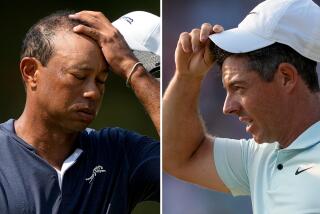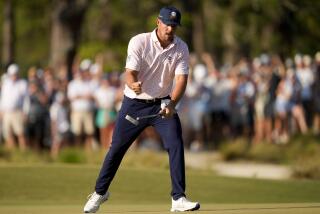There are many tests ahead for Open hopefuls
- Share via
It’s a rite of spring: fill out an application, then try to qualify for the U.S. Open.
Until April 29 the U.S. Golf Assn. is accepting applications from pros and amateurs who want to play at Bethpage Black in June.
The application fee is $150, caddies are optional, but your handicap can’t be higher than 1.4.
Last year, 8,044 golfers played 18 holes in local qualifying, 550 advanced to the 36-hole sectional qualifier, plus 288 others -- mostly pros -- exempt from the first round. Ultimately, 84 players qualified for the remaining U.S. Open spots.
Given the glut of applicants, the USGA tries to keep out bogus players. Still, some phonies tee it up.
Betsy Swain, USGA championship administrator, told Golf Digest: “Once a man showed up at a qualifying site in Florida with his clubs in a plastic garbage bag.”
This year players at the U.S. Open might also have to pass the PGA Tour’s drug test. Banned substances include: anabolic steroids, EPO, human growth hormone, marijuana, cocaine and over-the-counter products with certain stimulants.
A link on the USGA’s website allows players to print out a pocket-sized anti-doping reference card, presumably to keep next to their rules book.
Trivia time
Which U.S. president threw out the first ceremonial pitch to open the baseball season?
Long run
Three sled dogs died in the 1,100-mile Iditarod race in Alaska won Wednesday by Lance Mackey.
Before the event, the Wall Street Journal suggested sled dogs were “the planet’s best athletes.”
David Swain, an Old Dominion professor, estimated that a 50-pound mush dog burns 10,000 calories a day during the Iditarod, while a Tour de France rider who weighs three times as much burns only 6,000 calories each day.
You’re away
Golf legend Gary Player, 73, told Golf World about the state of his game: “I hit it so short now, I can hear the ball land.”
Trivia answer
William Howard Taft in 1910.
And finally
Washington’s reserve forward, senior Artem Wallace, isn’t likely to play much in the NCAA tournament.
But his majoring in Russian literature drew this comment from the Wall Street Journal: “Anyone with time to learn both the zone defense and the finer points of Turgenev deserves a trophy of his own.”
--
More to Read
Go beyond the scoreboard
Get the latest on L.A.'s teams in the daily Sports Report newsletter.
You may occasionally receive promotional content from the Los Angeles Times.











